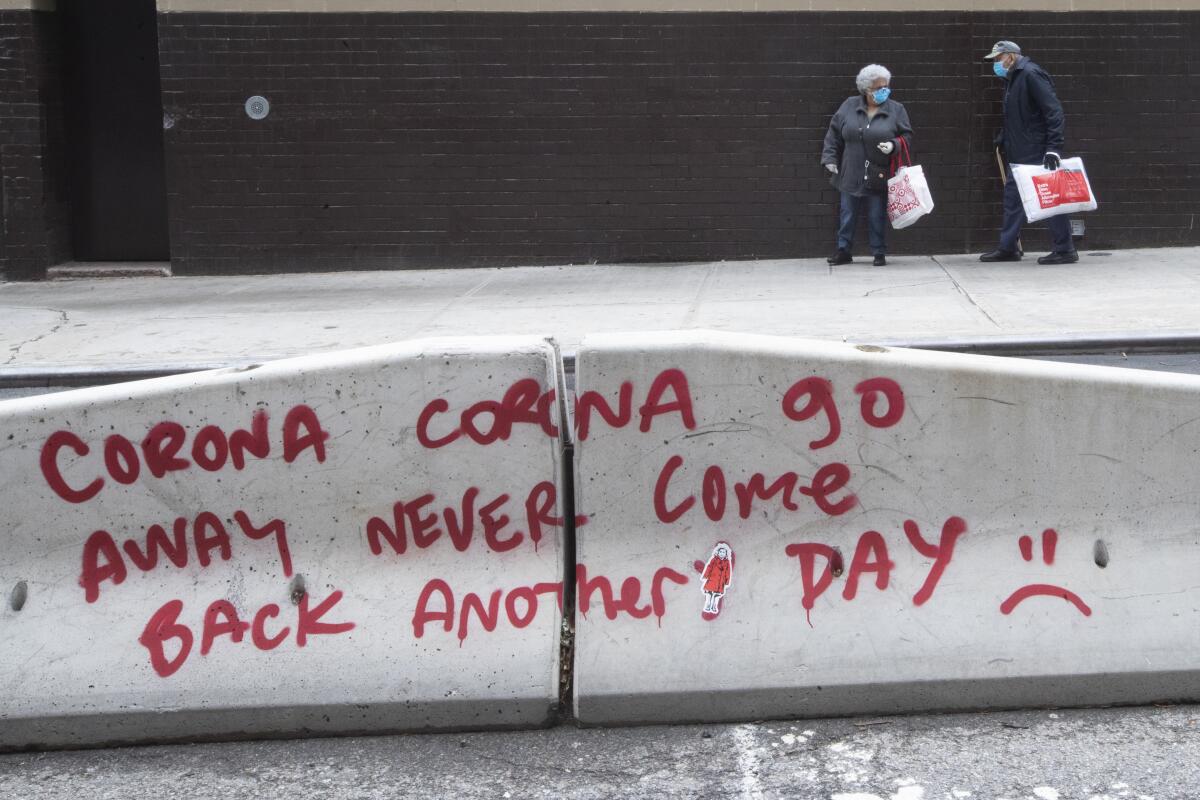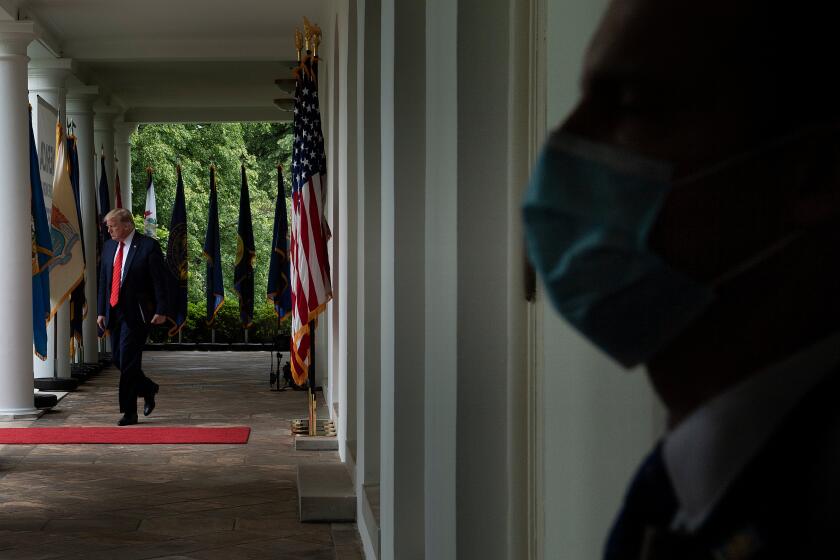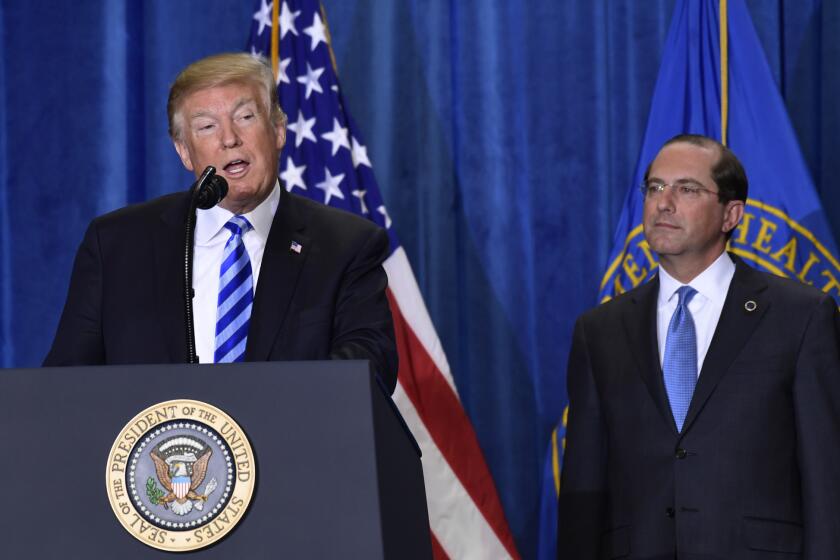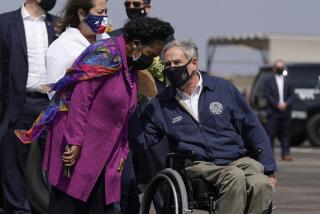U.S. COVID-19 death toll hits 80,000 as states continue reopening and Trump lashes out

- Share via
New York, the epicenter of the coronavirus crisis in the United States, plans to start reopening its economy in some upstate regions Friday, but New York City is unlikely to see nonessential business resume until June at the earliest.
“We’re now on the other side of the mountain,” Gov. Andrew Cuomo said at his daily news briefing. “Next step, how do we reopen? How do we reopen intelligently? And how do we reopen without taking a step back?”
As the number of coronavirus-related deaths in the nation surpassed 80,000, the number of deaths in New York dipped to 161 and the number of new coronavirus infections to 488 in the last 24 hours, levels last seen in March, he said. Cuomo’s statewide stay-at-home order ends Friday.
The state accounts for about a third of the COVID-19 deaths nationwide, according to Johns Hopkins University.
Across the country, elected leaders are weighing how to protect public health while starting to loosen restrictions on individuals and businesses. Some, including local leaders in Pennsylvania and Michigan, are going against the orders of their states’ governors.
Trump claimed coronavirus infections were ‘going down.’ They’re not. He says most testing isn’t needed. He is tested daily.
In Michigan, a hotbed of protests against shutdown orders, another armed rally is planned at the state capital on Thursday. Gov. Gretchen Whitmer on Monday asked Vice President Mike Pence to discourage the protests as a public-health hazard.
“We have seen from initial protests here ... that we’ve got COVID-19 spreading in rural parts of our state, from which people traveled,” Whitmer said during a call with governors, according to ABC News. “We’re going to keep watching those numbers and doing the tests.”
Shutdown opponents, including some who plan on attending Thursday’s protest, repeatedly called for the governor to be assassinated in four private Facebook groups, according to Metro Times. Facebook removed Michigan United for Liberty’s private group on Sunday, the organization said on the platform, using the post to encourage supporters to attend the protest.
Whitmer, who recently extended the stay-at-home order through May 28, has been sued by that protest group, a member of Congress and Republican state lawmakers who question the constitutionality of the extension. Some local officials are refusing to follow the orders.
The Shiawassee County sheriff announced that his department would not enforce Whitmer’s coronavirus restrictions. The mayor of Perry also announced that the city will not enforce the orders or assist other law enforcement agencies in doing so.
Polling shows that a majority Americans oppose the protests and overwhelmingly support enforcing stay-at-home orders and keeping businesses closed to stop the spread of coronavirus, but new surveys show the patience for shutdowns is beginning to drop.
Nearly 3 out of 4 respondents in a Gallup Poll released Monday said they are avoiding small gatherings, a 10-point drop from a poll a week prior. Another poll, by the Associated Press and NORC Center for Public Affairs Research, released Monday found that 71% support stay-at-home orders, down from 80% two weeks earlier. Just over two-thirds favored the shuttering of bars and restaurants, also down 9 points from the prior poll. More than half disapprove of the anti-shutdown protests; 31% approve of them.
More than 40 states have taken some steps to reopen their economies, including California. But the approaches vary widely among the states, and among counties and cities. Public health officials warn that if states reopen too quickly, without substantial reductions in infections and deaths as well as proper safeguards, they could see a surge of new cases.
On Monday, Louisiana Gov. John Bel Edwards said the state would begin reopening on Monday, and Massachusetts Gov. Charlie Baker laid out a four-phase plan also to begin Monday. South Carolina Gov. Henry McMaster, who had allowed restaurants to reopen on Monday, announced that gyms, pools, nail salons and other close-contact businesses could resume operations next week. Iowa Gov. Kim Reynolds, who has been partially self-quarantining after coming into contact last week with a White House staffer who tested positive, said she planned to further loosen restrictions there in coming days.
President Trump has been the loudest cheerleader for reopening the economy, in many cases encouraging officials to move far faster than laid out in his administration’s own guidelines for safely easing restrictions. The financial devastation brought about by the pandemic has undermined the foundation of the president’s reelection campaign — a robust economy.
Rick Bright, pushed out of a job heading a federal research agency, files a complaint saying he was retaliated against for resisting Trump’s plans.
On Monday, the president lashed out at Pennsylvania leaders, who have eased restrictions in less populous parts of the state but extended closures in the Philadelphia region through June 4.
“The great people of Pennsylvania want their freedom now, and they are fully aware of what that entails,” Trump tweeted Monday.
Asked at a Rose Garden news conference about whether he was putting politics ahead of public safety, Trump claimed Democratic governors in states that could safely reopen are choosing not to. He added that Americans are dying from substance abuse and suicides during the shutdown.
“The people want to go back, the numbers are getting to a point where they can and there just seems to be no effort on certain blue states to get back into gear, and the people aren’t going to stand for it,” Trump said. “They want our country open. I want our country open too. I want it open safely. But I want it open. Don’t forget ... people are dying in a lock-down position too.”
Trump, who has eschewed wearing a face mask or social distancing, made these remarks as the White House appears to have become an infection zone. At least two staffers have tested positive, and several top officials, including infectious disease expert Dr. Anthony Fauci, are self-quarantining.
Some local elected officials in Pennsylvania are flouting the governor’s reopening orders, with a state representative in York County hosting a meeting on Saturday that drew 150 people, many of whom did not wear masks or follow social distancing guidelines. Leaders of seven counties that have not yet been authorized to open have indicated they plan on following their own timetable.
Gov. Tom Wolf responded on Monday by threatening to cut off discretionary federal aid to these counties.
“To those politicians who decided to cave in to this coronavirus, they need to understand the consequences of their cowardly act,” Wolf said. “The funding we have put aside to help with fighting this crisis will go to the folks who are doing their part. However, other discretionary funding won’t go to counties that put us all at risk by operating illegally.”
In New York, Cuomo has divided the state into 10 regions that need to hit seven criteria regarding infections and hospital capacity to enter Phase 1 of the reopening process, which includes curbside retail, construction and manufacturing. Later phases involve in-store retail, restaurants and schools. There will be a two-week monitoring period between phases, and if the pandemic shows signs of resurgence in a region, the reopening will be paused until the outbreak is brought back under control.
Three regions currently qualify — the Southern Tier west of the Catskill Mountains; the Mohawk Valley near Albany; and the Finger Lakes and Rochester.
Statewide, low-risk recreation and businesses such as tennis courts, landscaping and drive-in movie theaters, can reopen on Friday, Cuomo said. “Talk about going back to the future. Back to drive-in movie theaters. I’m OK with that.”
One region that is nowhere close to reopening is the New York City metropolitan area.
“Unless something miraculous happens, we’re going into June,” New York City Mayor Bill de Blasio said Friday.
More to Read
Sign up for Essential California
The most important California stories and recommendations in your inbox every morning.
You may occasionally receive promotional content from the Los Angeles Times.
















